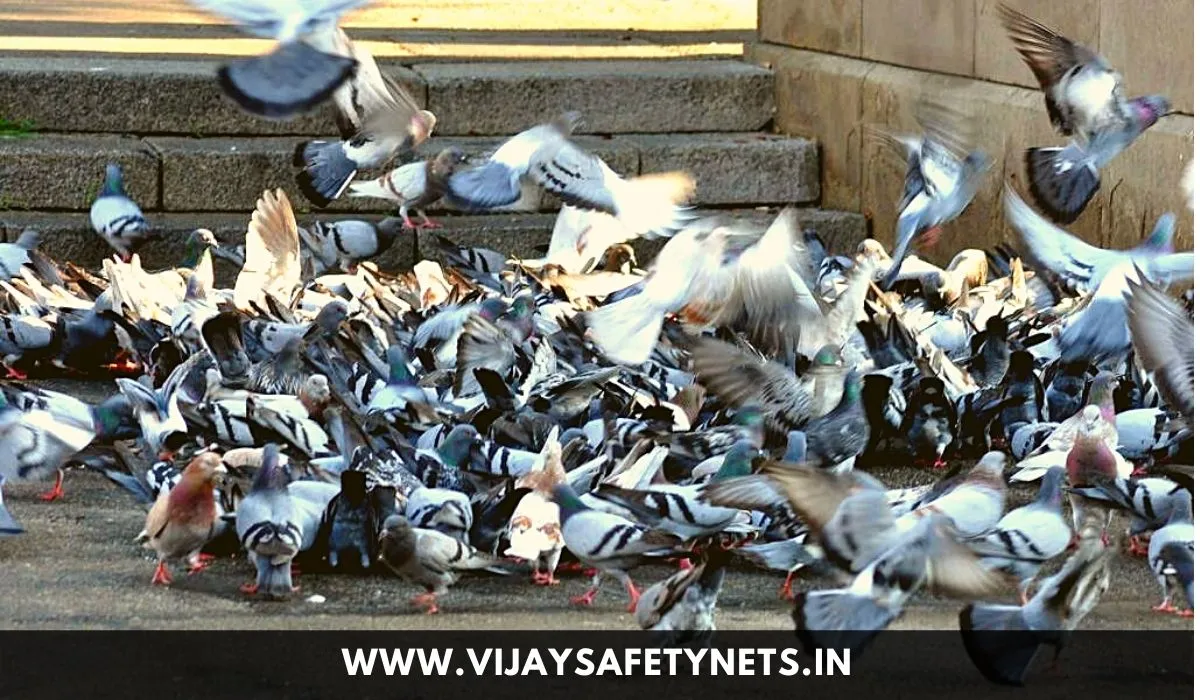You wouldn’t be blamed for assuming that common birds like pigeons and gulls are pests just because of their overpopulation, especially in metropolitan regions. In this blog post, we will be knowing about the diseases carried by pigeons, pigeon health hazards and how pigeons have been known to carry and transmit a variety of hazardous diseases.
When the number of pigeons reaches a certain point, droppings and feathers are left at roosting spots. These stacks can evoke a variety of recognized diseases and can cause major difficulties. Using a bird protection net around your house balcony is a safe way to avoid the situation.
Pigeon droppings are well known for carrying and spreading illnesses. Histoplasmosis, Pigeon Ornithosis, Salmonella, Cryptococcosis, Toxoplasmosis, and Encephalitis are all diseases that pigeons can transmit. Ticks, flies, fleas, mites, and biting lice are all ectoparasites that can live on pigeons and spread disease.
Fabric pests and pantry pests are two types of insects that live in pigeon nests. Pigeon droppings, on the other hand, can make structural surfaces slick and dangerous. Health claims and lawsuits stemming from pigeon-caused ailments or injuries can easily exceed ₹100K.
Here Are Some Of The Pigeon Health Hazards And Their Symptoms:
Histoplasmosis
Histoplasmosis is a disease caused by a fungus that develops in pigeon droppings, soils, and is found all over the world. When cleaning droppings, a person may breathe in part of the fungus, which can cause infection in circumstances of severe exposure. Common actions, such as washing windowsills, will not result in significant exposure.
Histoplasmosis symptoms develop about ten days after infection and include lethargy, fever, and chest pains. The majority of people, however, do not exhibit any symptoms. Those with weak immune systems are more likely to get Histoplasmosis.
NOTE: The sickness cannot be passed from one person to another.
Here are some of the most common histoplasmosis symptoms:
- Fever
- Muscle pain
- Dry cough
- Fatigue
- Headaches
- Chills
Cryptococcosis
Cryptococcosis is a fungal disease that grows and develops in soils all over the world and is related with pigeon droppings. Even at high levels of exposure, it is very rare that healthy people will become infected, and a weaker immune system is a main risk factor for infection.
Let’s look at some of the most severe cryptococcosis symptoms:
- Pneumonia-like symptoms
- Fever
- Coughing
Psittacosis
Psittacosis (also known as ornithosis or parrot fever) is a rare infectious disease that primarily affects parrots and parrot-like birds like cockatiels and parakeets, but can also affect other birds like pigeons. When bird droppings become airborne and dry, people may inhale them and become sick.
This bacterial disease causes lethargy, fever, headache, rash, chills, and, in some cases, pneumonia in humans. Psittacosis symptoms appear about ten days after exposure, and it is treatable with a common antibiotic.
Here are some key symptoms of psittacosis:
- Bloody spittle
- Dry cough
- Fatigue
- Fever
- Chills
- Muscle pain
- Tight chest
Toxoplasmosis
Toxoplasmosis is caused by the parasite Toxoplasma Gondii. Toxoplasmosis is present in humans globally, as well as numerous animal and bird species. There may be no symptoms, which normally appear 1 to 2 weeks following contact with the parasite. The condition can damage the brain, lungs, heart, eyes, or liver. Anti-malarial medication and antibiotics are used to treat the infection.
Here are some symptoms of psittacosis:
- Fever
- Swollen lymph nodes, especially in the neck
- Headache
- Muscle aches and pains
- Sore throat
Alveolitis
Alveolitis, also known as diffuse interstitial lung disease, is a category of lung illnesses characterised by inflammation of the deep lung tissues. It occurs in people who are hypersensitive to feathers, feather dust, and faecal material, particularly from pigeons. Signs can appear within two years, but with prolonged exposure, it can take 10 – 20 years.
Symptoms of Alveolitis include:
- Breathing difficulties
- Wheezing
- Dry coughs
Conclusion
Wild birds are more likely to carry disease than domestic birds. Pet birds may be less competent to combat diseases that become airborne. Humans who come into direct contact with pigeon droppings or inhale the aerosols produced by dried droppings may get a variety of diseases.
These diseases are often asymptomatic and likely to infect patients with weakened immune systems or those whose immune systems have previously been impaired.
“Studies have shown that Up to 60 different diseases could spread through bird/pigeon droppings.”
We at Vijay Safetynets can provide you with high quality, quick, and effective safety net services in all of the locations and nearby areas (location and city details are on the website) – simply get in touch today and stay safe from pigeon hazards.

